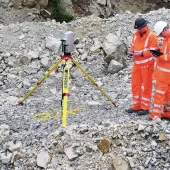MPA calls for limit to burdens and costs of regulation

Association says cumulative burden of tax and regulation on mineral products sector cuts deeply into industry GVA
THE Mineral Products Association’s second assessment of the cumulative impact of environmental and planning-related taxation and regulation has highlighted the ever-increasing scale and cost of this burden on the mineral products industry.
Key findings from the assessment include:
- Total sector costs of identified measures are £400 million per annum now, and likely to rise to £665 million per annum from 2020.
- Climate change and energy measures are currently equivalent to 17% of the gross value added (GVA) of the cement industry, but this proportion could increase to 77% from 2020 (from £51 million per annum to more than £250 million per annum).
- The costs to the lime industry of energy and climate change measures will increase from £8 million per annum in 2013 to £49 million per annum from 2020.
- Even for the less energy intensive aggregates, asphalt and ready-mixed concrete industries the cost of these measures will increase from £20 million per annum now to £48 million per annum from 2020.
- These measures include present and future costs associated with measures such as the European Emission Trading Scheme, the Renewables Obligation, Carbon Price Support tax and Climate Change Levy.
- Industry businesses have to manage the European Union Emissions Trading Scheme (EUETS), Climate Change Agreements (CCA) linked to the UK Climate Change Levy (CCL) and the Carbon Reduction Commitment Energy Efficiency Scheme (CRC), all focused on carbon reduction but with different scopes, different measurement requirements and potentially punitive penalties for inaccurate reporting.
- The annual cost of the aggregates levy is equivalent to 35% of industry GVA.
- The costs are in addition to the £900 million per annum costs of other taxes such as fuel duties and business rates.
- In addition to these headline figures there are numerous and growing stealth charges arising from regulatory organizations, such as the Environment Agency, and planning authorities for planning applications and related discussions, licences, meeting and monitoring charges and other development charges.
- The MPA has identified 228 items of planning legislation and regulation which have to be managed by the industry.
- Government has taken some action to moderate some of the regulatory burden on the sector but at the same time companies are having to manage new measures, for example the pointless application of CE marking requirements to the sector.
Commenting on the results, Nigel Jackson, chief executive of the MPA, said: ‘There is much talk about the cost and burden of regulation but little quantified evidence. We are seeking to provide this information for our sector, which is central to the improvement of our infrastructure, housing stock and built environment.
‘We are struggling already with significant regulatory costs and burdens, and the potential costs likely to be imposed on energy-intensive industries are particularly alarming. It is difficult to see how the UK can sustain essential production and manufacturing in the UK if we burden these industries with ever-increasing costs.
‘Apart from energy and climate measures, there is a relentless increase in the scope and quantity of regulatory costs and charges, and there is no mechanism within government that looks at the cumulative impact of such charges. This analysis understates the full impact of regulation as we have examined only environmental and planning measures.
‘The MPA is not opposed to regulation; we support and encourage high operating and sustainability standards and effective regulation, designed to achieve clear objectives and implemented efficiently, reasonably, consistently and proportionately. We also recognize that some areas of regulation are inadequate and that inconsistent enforcement remains a major concern of compliant businesses.
‘The outstanding message from this analysis (see attached PDF for the full assessment) is that there is an urgent need for government to limit the burden and costs of regulation on the mineral products industry if it wants to maintain the supply of mineral products from a sustainable UK industry.’









